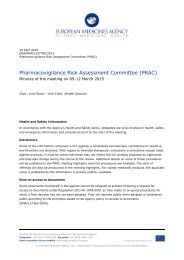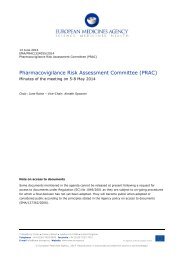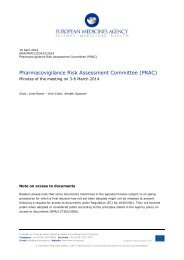European Statements of Hospital Pharmacy
European Statements of Hospital Pharmacy
European Statements of Hospital Pharmacy
Create successful ePaper yourself
Turn your PDF publications into a flip-book with our unique Google optimized e-Paper software.
The <strong>European</strong> <strong>Statements</strong> <strong>of</strong> <strong>Hospital</strong> <strong>Pharmacy</strong> <br />
Section 4: Clinical <strong>Pharmacy</strong> Services <br />
4.1 <strong>Hospital</strong> pharmacists should be involved in all patient care settings to prospectively <br />
influence collaborative, multidisciplinary therapeutic decision-‐making; they should play a <br />
full part in decision making including advising, implementing and monitoring medication <br />
changes in full partnership with patients, carers and other health care pr<strong>of</strong>essionals. <br />
4.2 All prescriptions should be reviewed and validated as soon as possible by a hospital <br />
pharmacist. Whenever the clinical situation allows, this review should take place prior <br />
to the supply and administration <strong>of</strong> medicines. <br />
4.3 <strong>Hospital</strong> pharmacists should have access to the patients’ health record. Their clinical <br />
interventions should be documented in the patients’ health record and analysed to <br />
inform quality improvement interventions. <br />
4.4 All the medicines used by patients should be entered on the patient’s medical record and <br />
reconciled by the hospital pharmacist on admission. <strong>Hospital</strong> pharmacists should assess <br />
the appropriateness <strong>of</strong> all patients’ medicines, including herbal and dietary supplements. <br />
4.5 <strong>Hospital</strong> pharmacists should promote seamless care by contributing to transfer <strong>of</strong> <br />
information about medicines whenever patients move between and within healthcare <br />
settings. <br />
4.6 <strong>Hospital</strong> pharmacists, as an integral part <strong>of</strong> all patient care teams, should ensure that <br />
patients and carers are <strong>of</strong>fered information about their clinical management options, <br />
and especially about the use <strong>of</strong> their medicines, in terms they can understand. <br />
4.7 <strong>Hospital</strong> pharmacists should inform, educate and advise patients, carers and other <br />
health care pr<strong>of</strong>essionals when medicines are used outside <strong>of</strong> their marketing <br />
authorisation. <br />
4.8 Clinical pharmacy services should continuously evolve to optimise patients’ outcomes. <br />
5








